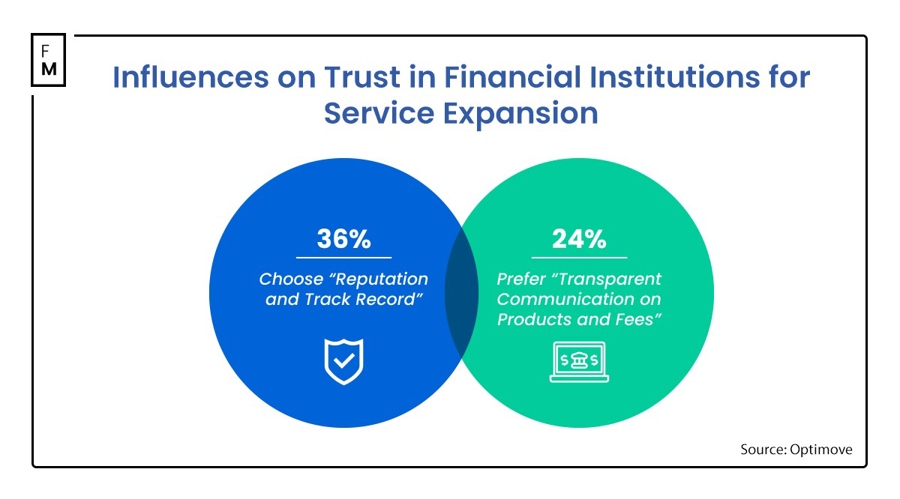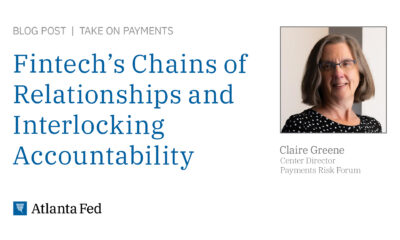Fintech
“60% of Clients Don’t Trust Financial Institutions”: Fintech’s Customer-Centric Shift

In any business, especially
financial services, if you can get a customer to use more services, it reduces
churn. Of course, the starting point in financial services is that there is trust
between the provider and the client. With trust, a client can be open to other
services.
With that said, a research by Optimove revealed
that customers have limited trust in financial advisors for multiple financial
needs. The survey of 260 US customers of financial institutions with household
incomes of $100,000-plus, revealed that just 40% of clients of these firms
implicitly trust their financial institution as the primary financial advisor
for multiple financial needs.
It underscores that 60% of respondents do not “totally
trust” their financial service provider as their primary financial advisor for
multiple financial needs.
Retaining customers is harder. In
today’s dynamic financial landscape, characterized by evolving customer
expectations and rapid technological advancements, the banking sector faces
unprecedented challenges in retaining customers. As people prove to be
inherently unpredictable, navigating this uncertainty requires innovative
strategies tailored to the modern fintech landscape.
Human behavior is complex,
influenced by subjective, emotional, and context-dependent factors. Traditional
banking strategies, often reliant on rigid frameworks, struggle to adapt to
this unpredictability. As a result, customer churn rates
can rise, exacerbated by increased competition and regulatory constraints.
Financial service
companies are at the forefront of revolutionizing the banking industry,
leveraging innovative technologies and customer-centric approaches to address
the challenges of unpredictability and churn.
The Role of Data and Emotional
Intelligence in Fintech
Fintech firms are revolutionizing
customer experiences through the strategic utilization of data analytics and
artificial intelligence. By leveraging these technologies, they can delve deep
into individual customer preferences and behaviors, paving the way for
personalized interactions. Tailoring services to meet the unique needs of each
customer fosters stronger connections and cultivates loyalty, thus enhancing
the overall customer experience.
Artificial Intelligence in Financial Technology
▶️ Source @FPrimeCapital
via @enricomolinari #⃣ #fintech #finserv #GenerativeAI #marketing #AI #govtech #ehealth #insurtech #banking #payments #neobanks #ChatGPT4 #innovation #leonardoai #enricomolinari @Nicochan33 @BetaMoroney… pic.twitter.com/QSl4M98sai— Enrico Molinari #CES2024 (@enricomolinari) April 29, 2024
Real-time engagement lies at the
heart of effective customer communication for fintech companies. Embracing
channels like chatbots, mobile apps, and social media platforms
enables prompt and efficient interaction with customers. Timely assistance and
support not only build trust but also play a crucial role in mitigating churn,
ensuring sustained customer satisfaction.
The adoption of predictive
analytics
Analytics
Analytics may be defined as the detection, analysis, and relay of consequential patterns in data. Analytics also seeks to explain or accurately reflect the relationship between data and effective decision making. In the trading space, analytics are applied in a predictive manner in an attempt to more accurately forecast the price. This predictive model of analytics generally involves the analysis of historical price patterns that are used in an attempt to determine certain price outcomes. Analyt
Analytics may be defined as the detection, analysis, and relay of consequential patterns in data. Analytics also seeks to explain or accurately reflect the relationship between data and effective decision making. In the trading space, analytics are applied in a predictive manner in an attempt to more accurately forecast the price. This predictive model of analytics generally involves the analysis of historical price patterns that are used in an attempt to determine certain price outcomes. Analyt
Read this Term empowers fintech firms to anticipate customer needs and offer
proactive solutions. By staying ahead of the curve, they enhance the customer
experience and nurture long-term relationships. Anticipatory services tailored
to individual preferences contribute significantly to customer satisfaction and
loyalty.
In addition to transactional
interactions, fintech companies are recognizing the importance of infusing
emotional intelligence into their communication strategies. Empathetic and
understanding communication resonates deeply with customers, strengthening their
emotional connection with the brand. This human touch adds depth to the
customer experience, fostering trust and loyalty in the long run.
Financial institutions are
increasingly integrating themselves into the lives of their customers by
harnessing the power of first-party data. For instance, Chase has launched
Chase Media Solutions, a digital
media business connecting millions of customers with brands they love.
Leveraging first-party financial data, this initiative enables personalized
offers and cashback opportunities for customers while providing tailored
experiences. This integration not only enhances customer engagement but also
forges stronger bonds between customers and the financial institution, creating
a win-win scenario for all parties involved.
Case Studies in Fintech Success
Numerous fintech firms have
already demonstrated the effectiveness of these strategies in improving
customer retention and reducing churn. Financial service companies have integrated
customer-led marketing platforms
as a cornerstone of their retention marketing
Marketing
Marketing is defined as the business process of identifying, anticipating and satisfying customers’ needs and wants.This is a crucial element of any operation or brokerage in the financial services space. Well-funded marketing campaigns are instrumental to the survival and longevity of these companies in an increasingly competitive industry.Within the forex space, marketers perform a wide range of functions to help procure, secure, or retain clients.In particular, newer forex brokers also have t
Marketing is defined as the business process of identifying, anticipating and satisfying customers’ needs and wants.This is a crucial element of any operation or brokerage in the financial services space. Well-funded marketing campaigns are instrumental to the survival and longevity of these companies in an increasingly competitive industry.Within the forex space, marketers perform a wide range of functions to help procure, secure, or retain clients.In particular, newer forex brokers also have t
Read this Term, empowering these brands to
deliver personalized, emotionally intelligent communications in real-time. By
micro-segmenting customers based on predicted behavior and value, these
platforms enable financial marketers to maximize engagement and lifetime value.
Customer Retention Strategies
As the banking industry continues
to evolve, fintech companies must remain agile and adaptive in their approach
to customer retention. By embracing innovation, leveraging data-driven
insights, and prioritizing customer-centricity, they can navigate the complexities
of human behavior and emerge as leaders in the ever-changing financial
landscape.
Tech and #fintech companies are challenging #banks to assess the role they play and how they must adapt.
Innovation and evolving customer demands have given rise to #embeddedfinance. However, banks do not want to be entirely cut out of the equation.Read the latest … pic.twitter.com/TwtEKK7SjJ
— Marcus Swanepoel (@Autism_Father) May 9, 2024
While people may be
unpredictable, fintech companies possess the tools and strategies necessary to
enhance customer retention and mitigate churn in the banking sector. By
prioritizing personalized experiences, real-time engagement, predictive analytics, and
emotional intelligence, they can build stronger relationships with customers
and thrive in an era of rapid change. It all starts with the customer, knowing
their needs and wants. As financial
institutions have access to each customer’s first-party data, they start with a
leg-up on competitors in continually earning the customer’s business.
In the end, financial
institutions should focus marketing on their track record when looking to
cross-sell products. The aforementioned research
revealed: When asked about the factors that influence respondents’ level of
trust in their financial institution when considering purchasing additional
services, the top choice was “Reputation and track record,” selected by 36% of
respondents, followed by “transparent communication about products and fees”
noted by 24%.
In any business, especially
financial services, if you can get a customer to use more services, it reduces
churn. Of course, the starting point in financial services is that there is trust
between the provider and the client. With trust, a client can be open to other
services.
With that said, a research by Optimove revealed
that customers have limited trust in financial advisors for multiple financial
needs. The survey of 260 US customers of financial institutions with household
incomes of $100,000-plus, revealed that just 40% of clients of these firms
implicitly trust their financial institution as the primary financial advisor
for multiple financial needs.
It underscores that 60% of respondents do not “totally
trust” their financial service provider as their primary financial advisor for
multiple financial needs.
Retaining customers is harder. In
today’s dynamic financial landscape, characterized by evolving customer
expectations and rapid technological advancements, the banking sector faces
unprecedented challenges in retaining customers. As people prove to be
inherently unpredictable, navigating this uncertainty requires innovative
strategies tailored to the modern fintech landscape.
Human behavior is complex,
influenced by subjective, emotional, and context-dependent factors. Traditional
banking strategies, often reliant on rigid frameworks, struggle to adapt to
this unpredictability. As a result, customer churn rates
can rise, exacerbated by increased competition and regulatory constraints.
Financial service
companies are at the forefront of revolutionizing the banking industry,
leveraging innovative technologies and customer-centric approaches to address
the challenges of unpredictability and churn.
The Role of Data and Emotional
Intelligence in Fintech
Fintech firms are revolutionizing
customer experiences through the strategic utilization of data analytics and
artificial intelligence. By leveraging these technologies, they can delve deep
into individual customer preferences and behaviors, paving the way for
personalized interactions. Tailoring services to meet the unique needs of each
customer fosters stronger connections and cultivates loyalty, thus enhancing
the overall customer experience.
Artificial Intelligence in Financial Technology
▶️ Source @FPrimeCapital
via @enricomolinari #⃣ #fintech #finserv #GenerativeAI #marketing #AI #govtech #ehealth #insurtech #banking #payments #neobanks #ChatGPT4 #innovation #leonardoai #enricomolinari @Nicochan33 @BetaMoroney… pic.twitter.com/QSl4M98sai— Enrico Molinari #CES2024 (@enricomolinari) April 29, 2024
Real-time engagement lies at the
heart of effective customer communication for fintech companies. Embracing
channels like chatbots, mobile apps, and social media platforms
enables prompt and efficient interaction with customers. Timely assistance and
support not only build trust but also play a crucial role in mitigating churn,
ensuring sustained customer satisfaction.
The adoption of predictive
analytics
Analytics
Analytics may be defined as the detection, analysis, and relay of consequential patterns in data. Analytics also seeks to explain or accurately reflect the relationship between data and effective decision making. In the trading space, analytics are applied in a predictive manner in an attempt to more accurately forecast the price. This predictive model of analytics generally involves the analysis of historical price patterns that are used in an attempt to determine certain price outcomes. Analyt
Analytics may be defined as the detection, analysis, and relay of consequential patterns in data. Analytics also seeks to explain or accurately reflect the relationship between data and effective decision making. In the trading space, analytics are applied in a predictive manner in an attempt to more accurately forecast the price. This predictive model of analytics generally involves the analysis of historical price patterns that are used in an attempt to determine certain price outcomes. Analyt
Read this Term empowers fintech firms to anticipate customer needs and offer
proactive solutions. By staying ahead of the curve, they enhance the customer
experience and nurture long-term relationships. Anticipatory services tailored
to individual preferences contribute significantly to customer satisfaction and
loyalty.
In addition to transactional
interactions, fintech companies are recognizing the importance of infusing
emotional intelligence into their communication strategies. Empathetic and
understanding communication resonates deeply with customers, strengthening their
emotional connection with the brand. This human touch adds depth to the
customer experience, fostering trust and loyalty in the long run.
Financial institutions are
increasingly integrating themselves into the lives of their customers by
harnessing the power of first-party data. For instance, Chase has launched
Chase Media Solutions, a digital
media business connecting millions of customers with brands they love.
Leveraging first-party financial data, this initiative enables personalized
offers and cashback opportunities for customers while providing tailored
experiences. This integration not only enhances customer engagement but also
forges stronger bonds between customers and the financial institution, creating
a win-win scenario for all parties involved.
Case Studies in Fintech Success
Numerous fintech firms have
already demonstrated the effectiveness of these strategies in improving
customer retention and reducing churn. Financial service companies have integrated
customer-led marketing platforms
as a cornerstone of their retention marketing
Marketing
Marketing is defined as the business process of identifying, anticipating and satisfying customers’ needs and wants.This is a crucial element of any operation or brokerage in the financial services space. Well-funded marketing campaigns are instrumental to the survival and longevity of these companies in an increasingly competitive industry.Within the forex space, marketers perform a wide range of functions to help procure, secure, or retain clients.In particular, newer forex brokers also have t
Marketing is defined as the business process of identifying, anticipating and satisfying customers’ needs and wants.This is a crucial element of any operation or brokerage in the financial services space. Well-funded marketing campaigns are instrumental to the survival and longevity of these companies in an increasingly competitive industry.Within the forex space, marketers perform a wide range of functions to help procure, secure, or retain clients.In particular, newer forex brokers also have t
Read this Term, empowering these brands to
deliver personalized, emotionally intelligent communications in real-time. By
micro-segmenting customers based on predicted behavior and value, these
platforms enable financial marketers to maximize engagement and lifetime value.
Customer Retention Strategies
As the banking industry continues
to evolve, fintech companies must remain agile and adaptive in their approach
to customer retention. By embracing innovation, leveraging data-driven
insights, and prioritizing customer-centricity, they can navigate the complexities
of human behavior and emerge as leaders in the ever-changing financial
landscape.
Tech and #fintech companies are challenging #banks to assess the role they play and how they must adapt.
Innovation and evolving customer demands have given rise to #embeddedfinance. However, banks do not want to be entirely cut out of the equation.Read the latest … pic.twitter.com/TwtEKK7SjJ
— Marcus Swanepoel (@Autism_Father) May 9, 2024
While people may be
unpredictable, fintech companies possess the tools and strategies necessary to
enhance customer retention and mitigate churn in the banking sector. By
prioritizing personalized experiences, real-time engagement, predictive analytics, and
emotional intelligence, they can build stronger relationships with customers
and thrive in an era of rapid change. It all starts with the customer, knowing
their needs and wants. As financial
institutions have access to each customer’s first-party data, they start with a
leg-up on competitors in continually earning the customer’s business.
In the end, financial
institutions should focus marketing on their track record when looking to
cross-sell products. The aforementioned research
revealed: When asked about the factors that influence respondents’ level of
trust in their financial institution when considering purchasing additional
services, the top choice was “Reputation and track record,” selected by 36% of
respondents, followed by “transparent communication about products and fees”
noted by 24%.
Fintech
US Agencies Request Information on Bank-Fintech Dealings

Federal banking regulators have issued a statement reminding banks of the potential risks associated with third-party arrangements to provide bank deposit products and services.
The agencies support responsible innovation and banks that engage in these arrangements in a safe and fair manner and in compliance with applicable law. While these arrangements may offer benefits, supervisory experience has identified a number of safety and soundness, compliance, and consumer concerns with the management of these arrangements. The statement details potential risks and provides examples of effective risk management practices for these arrangements. Additionally, the statement reminds banks of existing legal requirements, guidance, and related resources and provides insights that the agencies have gained through their oversight. The statement does not establish new supervisory expectations.
Separately, the agencies requested additional information on a broad range of arrangements between banks and fintechs, including for deposit, payment, and lending products and services. The agencies are seeking input on the nature and implications of arrangements between banks and fintechs and effective risk management practices.
The agencies are considering whether to take additional steps to ensure that banks effectively manage the risks associated with these different types of arrangements.
SUBSCRIBE TO THE NEWSLETTER
And get exclusive articles on the stock markets
Fintech
What changes in financial regulation have impacted the development of financial technology?

Exploring the complex landscape of global financial regulation, we gather insights from leading fintech leaders, including CEOs and finance experts. From the game-changing impact of PSD2 to the significant role of GDPR in data security, explore the four key regulatory changes that have reshaped fintech development, answering the question: “What changes in financial regulation have impacted fintech development?”
- PSD2 revolutionizes access to financial technology
- GDPR Improves Fintech Data Privacy
- Regulatory Sandboxes Drive Fintech Innovation
- GDPR Impacts Fintech Data Security
PSD2 revolutionizes access to financial technology
When it comes to regulatory impact on fintech development, nothing comes close to PSD2. This EU regulation has created a new level playing field for market players of all sizes, from fintech startups to established banks. It has had a ripple effect on other markets around the world, inspiring similar regulatory frameworks and driving global innovation in fintech.
The Payment Services Directive (PSD2), the EU law in force since 2018, has revolutionized the fintech industry by requiring banks to provide third-party payment providers (TPPs) with access to payment services and customer account information via open APIs. This has democratized access to financial data, fostering the development of personalized financial instruments and seamless payment solutions. Advanced security measures such as Strong Customer Authentication (SCA) have increased consumer trust, pushing both fintech companies and traditional banks to innovate and collaborate more effectively, resulting in a dynamic and consumer-friendly financial ecosystem.
The impact of PSD2 has extended beyond the EU, inspiring similar regulations around the world. Countries such as the UK, Australia and Canada have launched their own open banking initiatives, spurred by the benefits seen in the EU. PSD2 has highlighted the benefits of open banking, also prompting US financial institutions and fintech companies to explore similar initiatives voluntarily.
This has led to a global wave of fintech innovation, with financial institutions and fintech companies offering more integrated, personalized and secure services. The EU’s leadership in open banking through PSD2 has set a global standard, promoting regulatory harmonization and fostering an interconnected and innovative global financial ecosystem.
Looking ahead, the EU’s PSD3 proposals and Financial Data Access (FIDA) regulations promise to further advance open banking. PSD3 aims to refine and build on PSD2, with a focus on improving transaction security, fraud prevention, and integration between banks and TPPs. FIDA will expand data sharing beyond payment accounts to include areas such as insurance and investments, paving the way for more comprehensive financial products and services.
These developments are set to further enhance connectivity, efficiency and innovation in financial services, cementing open banking as a key component of the global financial infrastructure.
General Manager, Technology and Product Consultant Fintech, Insurtech, Miquido
GDPR Improves Fintech Data Privacy
Privacy and data protection have been taken to another level by the General Data Protection Regulation (GDPR), forcing fintech companies to tighten their data management. In compliance with the GDPR, organizations must ensure that personal data is processed fairly, transparently, and securely.
This has led to increased innovation in fintech towards technologies such as encryption and anonymization for data protection. GDPR was described as a top priority in the data protection strategies of 92% of US-based companies surveyed by PwC.
Financial Expert, Sterlinx Global
Regulatory Sandboxes Drive Fintech Innovation
Since the UK’s Financial Conduct Authority (FCA) pioneered sandbox regulatory frameworks in 2016 to enable fintech startups to explore new products and services, similar frameworks have been introduced in other countries.
This has reduced the “crippling effect on innovation” caused by a “one size fits all” regulatory approach, which would also require machines to be built to complete regulatory compliance before any testing. Successful applications within sandboxes give regulators the confidence to move forward and address gaps in laws, regulations, or supervisory approaches. This has led to widespread adoption of new technologies and business models and helped channel private sector dynamism, while keeping consumers protected and imposing appropriate regulatory requirements.
Co-founder, UK Linkology
GDPR Impacts Fintech Data Security
A big change in financial regulations that has had a real impact on fintech is the 2018 EU General Data Protection Regulation (GDPR). I have seen how GDPR has pushed us to focus more on user privacy and data security.
GDPR means we have to handle personal data much more carefully. At Leverage, we have had to step up our game to meet these new rules. We have improved our data encryption and started doing regular security audits. It was a little tricky at first, but it has made our systems much more secure.
For example, we’ve added features that give users more control over their data, like simple consent tools and clear privacy notices. These changes have helped us comply with GDPR and made our customers feel more confident in how we handle their information.
I believe that GDPR has made fintech companies, including us at Leverage, more transparent and secure. It has helped build trust with our users, showing them that we take data protection seriously.
CEO & Co-Founder, Leverage Planning
Related Articles
Fintech
M2P Fintech About to Raise $80M

Application Programming Interface (API) Infrastructure Platform M2P Financial Technology has reached the final round to raise $80 million, at a valuation of $900 million.
Specifically, M2P Fintech, formerly known as Yap, is closing a new funding round involving new and existing investors, according to entrackr.com. The India-based company, which last raised funding two and a half years ago, previously secured $56 million in a round led by Insight Partners, earning a post-money valuation of $650 million.
A source indicated that M2P Fintech is ready to raise $80 million in this new funding round, led by a new investor. Existing backers, including Insight Partners, are also expected to participate. The new funding is expected to go toward enhancing the company’s technology infrastructure and driving growth in domestic and international markets.
What does M2P Fintech do?
M2P Fintech’s API platform enables businesses to provide branded financial services through partnerships with fintech companies while maintaining regulatory compliance. In addition to its operations in India, the company is active in Nepal, UAE, Australia, New Zealand, Philippines, Bahrain, Egypt, and many other countries.
Another source revealed that M2P Fintech’s valuation in this funding round is expected to be between USD 880 million and USD 900 million (post-money). The company has reportedly received a term sheet and the deal is expected to be publicly announced soon. The Tiger Global-backed company has acquired six companies to date, including Goals101, Syntizen, and BSG ITSOFT, to enhance its service offerings.
According to TheKredible, Beenext is the company’s largest shareholder with over 13% ownership, while the co-founders collectively own 34% of the company. Although M2P Fintech has yet to release its FY24 financials, it has reported a significant increase in operating revenue. However, this growth has also been accompanied by a substantial increase in losses.
Fintech
Scottish financial technology firm Aveni secures £11m to expand AI offering

By Gloria Methri
Today
- To come
- Aveni Assistance
- Aveni Detection
Artificial intelligence Financial Technology Aveni has announced one of the largest Series A investments in a Scottish company this year, amounting to £11 million. The investment is led by Puma Private Equity with participation from Par Equity, Lloyds Banking Group and Nationwide.
Aveni combines AI expertise with extensive financial services experience to create large language models (LLMs) and AI products designed specifically for the financial services industry. It is trusted by some of the UK’s leading financial services firms. It has seen significant business growth over the past two years through its conformity and productivity solutions, Aveni Detect and Aveni Assist.
This investment will enable Aveni to build on the success of its existing products, further consolidate its presence in the sector and introduce advanced technologies through FinLLM, a large-scale language model specifically for financial services.
FinLLM is being developed in partnership with new investors Lloyds Banking Group and Nationwide. It is a large, industry-aligned language model that aims to set the standard for transparent, responsible and ethical adoption of generative AI in UK financial services.
Following the investment, the team developing the FinLLM will be based at the Edinburgh Futures Institute, in a state-of-the-art facility.
Joseph Twigg, CEO of Aveniexplained, “The financial services industry doesn’t need AI models that can quote Shakespeare; it needs AI models that deliver transparency, trust, and most importantly, fairness. The way to achieve this is to develop small, highly tuned language models, trained on financial services data, and reviewed by financial services experts for specific financial services use cases. Generative AI is the most significant technological evolution of our generation, and we are in the early stages of adoption. This represents a significant opportunity for Aveni and our partners. The goal with FinLLM is to set a new standard for the controlled, responsible, and ethical adoption of generative AI, outperforming all other generic models in our select financial services use cases.”
Previous Article
Network International and Biz2X Sign Partnership for SME Financing
IBSi Daily News Analysis

SMBs Leverage Cloud to Gain Competitive Advantage, Study Shows
IBSi FinTech Magazine

- The Most Trusted FinTech Magazine Since 1991
- Digital monthly issue
- Over 60 pages of research, analysis, interviews, opinions and rankings
- Global coverage
subscribe now
-

 DeFi10 months ago
DeFi10 months agoDeFi Technologies Appoints Andrew Forson to Board of Directors
-

 Fintech10 months ago
Fintech10 months agoUS Agencies Request Information on Bank-Fintech Dealings
-

 News11 months ago
News11 months agoBlock Investors Need More to Assess Crypto Unit’s Earnings Potential, Analysts Say — TradingView News
-

 DeFi10 months ago
DeFi10 months agoSwitchboard Revolutionizes DeFi with New Oracle Aggregator
-

 DeFi10 months ago
DeFi10 months agoIs Zypto Wallet a Reliable Choice for DeFi Users?
-

 News11 months ago
News11 months agoBitcoin and Technology Correlation Collapses Due to Excess Supply
-

 Fintech10 months ago
Fintech10 months agoWhat changes in financial regulation have impacted the development of financial technology?
-

 Fintech10 months ago
Fintech10 months agoScottish financial technology firm Aveni secures £11m to expand AI offering
-

 Fintech10 months ago
Fintech10 months agoScottish financial technology firm Aveni raises £11m to develop custom AI model for financial services
-

 News1 year ago
News1 year agoValueZone launches new tools to maximize earnings during the ongoing crypto summer
-

 Videos4 months ago
Videos4 months ago“Artificial intelligence is bringing us to a future that we may not survive” – Sco to Whitney Webb’s Waorting!
-

 Markets1 year ago
Markets1 year agoCrypto Expert Provides Analysis of Top Altcoins, Market Sees Slight Rise


















